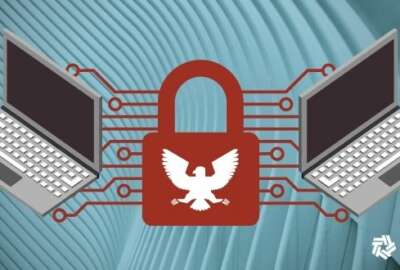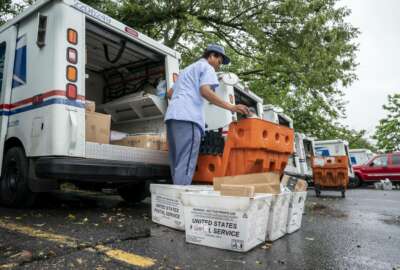USPS loses out on millions of dollars from one postage counterfeiter
In today's Federal Newscast, federal prosecutors are wrapping up one of the biggest counterfeit postage cases in years.
- Federal prosecutors are wrapping up one of the biggest counterfeit postage cases in years. A Los Angeles-area woman pleaded guilty to defrauding the Postal Service out of more than $150 million, using counterfeit postage to mail tens of millions of packages. The revenue USPS lost from this one case is greater than all the counterfeit postage losses its law enforcement arm, the U.S. Postal Inspection Service, saw over the past four years combined. The defendant in this case ran a package shipping business that delivered parcels to China-based logistics businesses. She faces a maximum 10-year federal prison sentence.
- Twenty-two federal employees across the country are taking home Federal Executive Board leadership awards this year. The annual awards program takes place during Public Service Recognition Week and highlights high-performing feds nationwide. A panel of judges picked the 2024 winners based on their contributions to leadership, customer service and community service, as well as diversity and inclusion. The awards program is open to all feds, both military and civilian, and working at any grade or level in government.(FEB leadership winners - Partnership for Public Service)
- The Office of Management and Budget took a major step in the revamping of the cloud security program called FedRAMP. OMB recently officially created the replacement for the Joint Authorization Board (JAB), called the FedRAMP Board, to provide executive oversight and governance of the program. OMB said the board includes chief information officers, chief information security officers and other technology experts from the General Services Administration, the Cybersecurity and Infrastructure Security Agency, the Federal Deposit Insurance Corporation, the Air Force and the departments of Defense and Veterans Affairs. The FedRAMP Board will have similar responsibilities as the JAB, such as reviewing and approving FedRAMP policies and requirements. The board, however, is not expected to approve individual vendor cloud authorization packages.(OMB forms replacement for FedRAMP JAB - Federal News Network)
- The House is turning up the accountability heat on the General Services Administration with the passage of the GSA Technology Accountability Act. Lawmakers approved the bill by unanimous consent on Monday. The legislation, sponsored by Reps. Pete Sessions (R-Texas) and Gerry Connolly (D-Va.), would require GSA to submit an annual report to Congress detailing the allocation and usage of funds from the Citizen Services Fund and the Acquisition Services Fund. Sessions said the bill aims to safeguard against the misuse of resources and improve the transparency of GSA IT projects. The bill now goes to the Senate Homeland Security and Governmental Affairs Committee for consideration.(House passes bill to turn up IT accountability heat on GSA - Rep. Pete Sessions (R-Texas))
- Dozens of major technology companies are pledging to meet security goals set by the Cybersecurity and Infrastructure Security Agency. CISA said 68 software companies, including Google and Microsoft, have made the “Secure by Design” pledge. The commitments include adopting multifactor authentication across their products within the next year. The companies have also pledged to eliminate default passwords, and increase security patching. CISA’s Secure by Design initiative is part of the Biden administration’s national cyber strategy. (CISA announces Secure by Design commitments from leading technology providers - Cybersecurity and Infrastructure Security Agency)
- It’s not the first time we’ve seen Pentagon directives ordering more reciprocity in cyber authorizations, but this one comes from the very top. A new memo from Deputy Defense Secretary Kathleen Hicks tells Defense Department components she expects them to reuse one another’s Risk Management Framework decisions. She also named the DoD Office of the Chief Information Officer as the adjudicator of any disagreements about whether reciprocity is appropriate. The new marching orders are mainly about speed. Hicks said the emphasis is on streamlining the delivery of new capabilities to the field.(Cybersecurity Reciprocity - Department of Defense)
- Senate appropriators are pushing to boost the Pentagon budget beyond the 1% cap imposed by the Fiscal Responsibility Act. Senate Defense Appropriations Subcommittee Chairman Jon Tester (D-Mont.) said the budget caps are “unreasonable and unrealistic.” Given the budget caps, the Defense Department decided to prioritize near-term readiness, including raising base pay and housing allowances. The department didn’t include modernization programs that will not deliver results before 2030 in the 2025 defense budget. Defense Secretary Lloyd Austin said they will remain on schedule with the projects if there is a growth in the top line figure in the coming years.(Appropriators push to go around budget caps, boost Pentagon budget - Federal News Network)
- The Defense Department has been laser-focused on software development, but it might have overlooked its hardware. Some functionality is sometimes a fundamental system limitation. It would need to be addressed at the system level instead of being pushed into software. Undersecretary of Defense for Acquisition and Sustainment William LaPlante said software and hardware have to be looked at holistically. He also said the Pentagon’s highly integrated architectures still remain the biggest impediment to software development within the department. (Pentagon focuses on software, but can’t forget hardware - Federal News Network)
- Agencies have a new set of qualifications to go by when hiring for positions in program evaluation. The Office of Personnel Management has laid out key skills and competencies for the program evaluation job series. OPM is also creating a new career pathing model for those occupations. A governmentwide study that OPM recently conducted helped inform what skills ended up on the final list. OPM said it'll soon release more guidance to help agencies make the updates when searching for qualified program evaluators.(Program evaluation updated position classification - Office of Personnel Management)
Copyright © 2025 Federal News Network. All rights reserved. This website is not intended for users located within the European Economic Area.
Eric White
Eric White is news anchor and Federal Drive producer at Federal News Network.
Follow @FEDERALNEWSCAST






